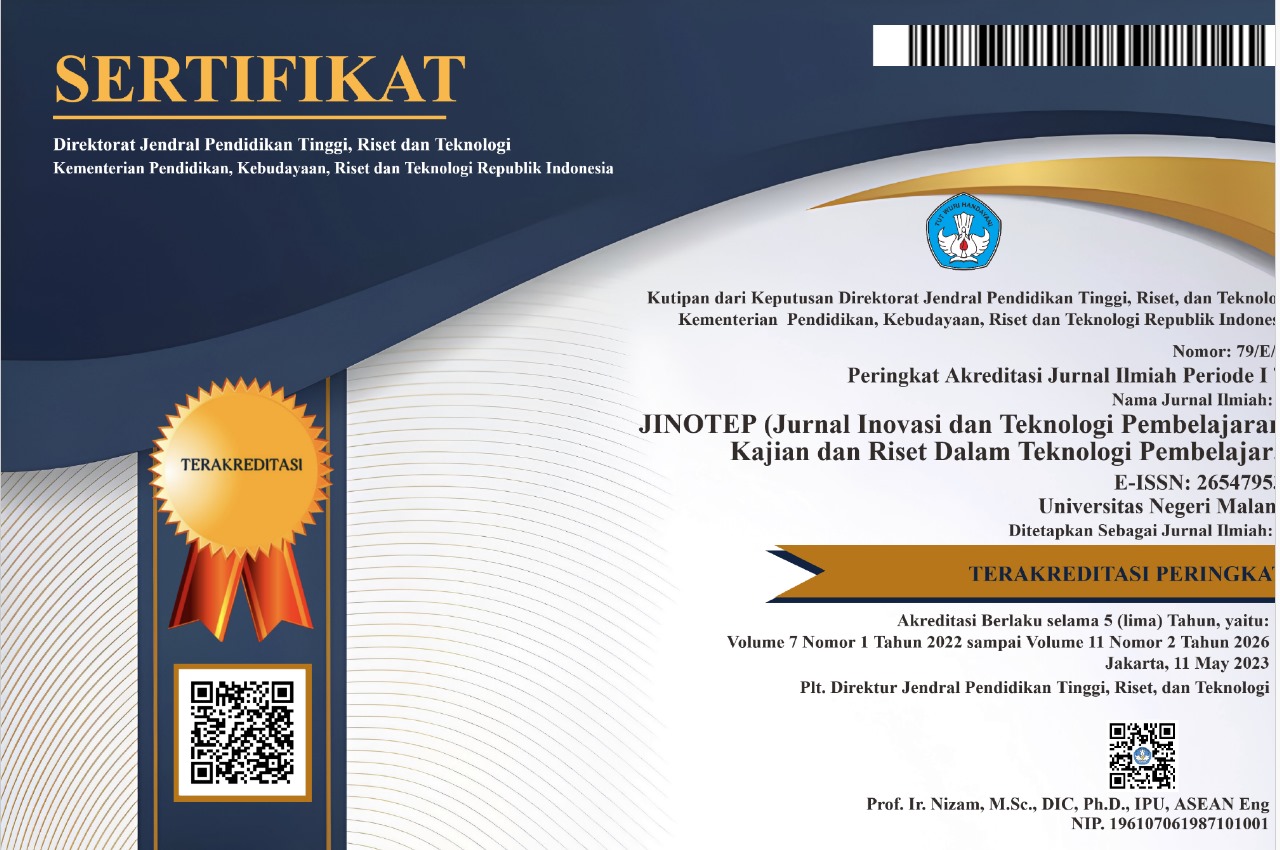Proptotype Seleksi Calon Kepala Sekolah Berbasis Psychological Testing (Study Determinan Factor Kepemimpinan Kepala SMA Di Jateng Tahun 2013)
Abstract
Abstrak: Rendahnya mutu pendidikan sebagaimana yang dilansir oleh PISA dan sejenisnya tidak bisa dipisahkan dari rendahnya mutu sekolah. Menurut Mendiknas (Kompas, 23 Maret 2011) menyatakan bahwa 88.8% sekolah kita tidak 40.31% dibawah Standar Pelayanan Minimal; 48.89% berada pada SPM (Standar Pelayanan Minimal) dan hanya 10.15% memenuhi SNP (Standar Nasional Pendidikan). Rendahnya mutu sekolah tidak terlepas dari kualitas kepemimpinan kepala sekolah. Penelitian ini melakukan inovasi dalam rekrut-men calon kepala sekolah yang selama ini hanya mengandalkan PDLT (Prestasi, Dedikasi, Loyalitas dan Tidak Tercela) dan Badan Pertimbangan Kenaikan Jabatan dan Kepangkatan (Baperjakat) yang penuh bias subyektivitas. Tujuannya untuk menemukan prototype selek-si calon kepala sekolah berbasis test psikologis yang bisa menjadi predictor determinan faktor penentu kualitas kepemimpinan kepala sekolah. Populasi penelitian ini adalah kepa-la sekolah SMA di Jateng yang melamar menjadi calon kepala sekolah. Temuan penelitian menunjukkan bahwa determinan faktor kepemimpinan kepala sekolah adalah: Potensi akademik (30,9%),Wawasan Kependidikan (18,7%); Kecerdasan Emosi (14,3%); Problem Solving (14.1%); Kreativitas (13.8%). Rekomendasi kebijakan yang diusulkan adalah agar dalam rekrutmen calon kepala sekolah memperhatikan kelima faktor tersebut di atas yakni potensi akademik, wawasan kependidikan, kecerdasan emosi, problem solving dan kreativitas. Pengangkatan kepala sekolah yang hanya didasarkan kedekatan dengan penguasa tanpa melalui seleksi yang benar akan sulit diharapkan menghasilkan kepala sekolah yang mampu menigkatkan mutu sekolah yang dipimpin.
Abstract: The low quality of education as reported by PISA and the like cannot be separated from the low quality of schools. According to the Minister of Education (Kompas, March 23, 2011) states that 88.8% of our schools are not 40.31% below the Minimum Service Standards; 48.89% were in SPM (Minimum Service Standards) and only 10.15% met SNP (National Education Standards). The low quality of schools is inseparable from the quality of leadership of the school principal. This research innovated in recruiting prospective school principals who all this time had only relied on PDLT (Achievement, Dedication, Loyalty and Not Despicable) and the Raising of Position and Rank (Baperjakat) Advisory Board which was full of subjectivity bias. The goal is to find a prospective school principal candidate prototype based on psychological tests that can be a predictor of determinants of school leadership determinants. The population of this study was the high school in Central Java who applied to become prospective school principals. The research findings show that the determinants of principals' leadership factors are: Academic potential (30.9%), Educational Insights (18.7%); Emotional Intelligence (14.3%); Problem Solving (14.1%); Creativity (13.8%). The recommended policy recommendations are so that in the recruitment of prospective school principals pay attention to the above five factors namely academic potential, educational insights, emotional intelligence, problem solving and creativity. Appointment of school principals that are only based on proximity to the authorities without going through correct selection will be difficult to expect to produce school principals who are able to improve the quality of the school being led.
Keywords
Full Text:
PDFReferences
Anastasi A. & Urbina. 1997. Psychological Testing. Upper Saddle River. NJ. Prentice Hall.
Anwar Prabu Mangkunegara. 2002. Evaluasi Kinerja SDM.
Barbutho, Jr. & Burbach; ME. 2006. The Emotional Intelligence of Transformational Leaders: A Field Study of Elected Official. The Journal Of Social Psycho-logy;146/1Heldref Publication.
Dave Whittington and Tammy Dewar; 2004: A strategic approach to organizational learning. Industrial and Commercial Training Volume 36 • Number 7 • 2004 • pp. 265-268 Emerald Group Publishing Limited •
Depdiknas. 2001. Manajemen Peningkatan Mutu Berbasis Sekolah; Buku 1 Konsep dan Pelaksanaan. Jakarta: Direktorat SLTP Dirjen Dikdasmen.
-------------. 2004. Model Pengembangan Kompetensi Kepala Sekolah. Jakarta: Depdiknas.
Jones, Goodwin dan Cunningham 2003: A study of Successful School
Lloyd C. Harris and Emmanuel Ogbonna, 1999: Leadership style and market orientation: an empirical study. Cardiff Business School, Cardiff University,Cardiff,Wales,UK. European Journal of Marketing, Vol. 35 No. 5/6, 2001, pp. 744-764. MCB University Press,
N. Hatton dan D. Smith 1992. Perspective on Effective school Rivai Veithzal, 2008, Manajemen Sumber Daya Manusia untuk Perusahaan, Bandung: PT. Remaja Rosdakarya
Rowley, Jennifer;1997. Academic leaders: made or born? Industrial and Commercial Training. Guilsborough: 1997. Vol. 29, Iss. 3; pg. 78
Ruth Mayhew,2014. Human Resources Mana-gers Appraisal Schemes. Texas Southern University. Publishing co.
Rysia Reynolds and Anne Ablett, 2008, Transforming the rhetoric of organi-zational learning to the reality of the learning organization. The Learning Organization Volume 5• Number 1•2008• pp. 24–35 © MCB Univer-sity Press • ISSN 0969-6474
Sergiovanni. Kolin. 1999. Management of Principals. New York University: West Publishing Company.
-----------------. 2001. The Principalship A Reflective Practice Perspective. (2nd Edution). Massa-chusetts:A Division of Simon & Schuster, Inc.
Shultz & Shultz. Duane. 2010. Psychological and Work Today. New York. Prentices Hall. Wahjosumidjo. 2001. Kepemimpinan Kepala Seko-lah (Tinjauan Teoritis dan Permasalahannya). Jakarta: PT Raja Grafindo Persada.
William D. Greenfield Jr,2004: Moral leadership in schools. Portland State University, Portland, Oregon, USA. Journal of Educational Admi-nistration Vol. 42 No. 2, 2004 pp. 174-196 q Emerald Group Publishing Limited 0957-8234 DOI 10.1108/09578230410525595
William Leban; Carol Zulauf.2004.Linking Emotional Intelligence Abilities and Transformational Leadership Styles. Leadership & Organization Development Journal; 2004; 25, 7/8; ABI/INFORM Global.pg. 55
DOI: http://dx.doi.org/10.17977/um031v1i22015p182
Refbacks
- There are currently no refbacks.
Copyright (c) 2015 Nugroho

This work is licensed under a Creative Commons Attribution-ShareAlike 4.0 International License.
======================================================================
Jurnal Inovasi dan Teknologi Pembelajaran published by Universitas Negeri Malang in collaboration with the Asosiasi Program Studi Teknologi Pendidikan Indonesia (APS TPI) and Ikatan Profesi Teknologi Pendidikan Indonesia (IPTPI) with a MoU.
Publisher Address:
Educational Technology Laboratorium, Building D5, 1st Floor
Faculty of Education, Universitas Negeri Malang
Semarang St. No. 5, Malang City, East Java Province, Postal Code 65145
Email: jinotep.fip@um.ac.id
======================================================================

JINOTEP is licensed under a Creative Commons Attribution-ShareAlike 4.0 International License.
JINOTEP Statistics (Since July 13th, 2020)


.png)




.png)
1.png)
1.png)
4.png)
2.png)
1.png)
1.png)
.png)


_3.png)





1.png)
.png)